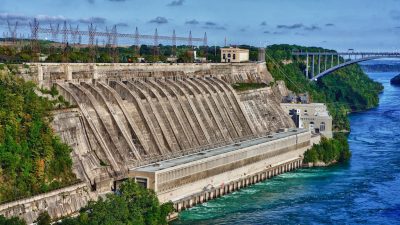
Experts say the New England Clean Energy Connect hydropower project could provide clean energy to more than one million homes in the Commonwealth. However, Massachusetts Gov. Charlie Baker is looking internationally for solutions for his 2016 diverse energy plan.
In July 2017, the Baker administration was presented with six options to reduce carbon emissions, said Lynn St-Laurent, advisor of public affairs and media at the electricity company Hydro-Quebéc, which would provide the service.
Initially, St-Laurent said Eversource’s Northern Pass transmission line project was chosen, which would have been routed through New Hampshire. After the needed permits were not awarded, she said Massachusetts abandoned the contract. Massachusetts is currently considering the NECEC Hydro project, which would outsource hydropower from Canada and run a transmission line through Maine.
St-Laurent said Central Maine Power develops the power lines on the United States’ side, while Hydro-Quebéc generates and delivers electricity from Quebéc.
CMP is seeking approval in Maine, while Hydro-Quebéc is proposing its infrastructure plans to neighboring Canadian communities, St-Laurent said. The proposed line route travels from Beattie Township, Maine, and connects to the New England grid in Lewiston, Maine.
Katie Gronendyke, a spokesperson for the Massachusetts Executive Office of Energy and Environmental Affairs, said in a statement that the NECEC Hydro project will help Massachusetts create clean and affordable energy.
“The Administration looks forward to the completion of the Department of Public Utilities’ thorough review of the contracts for the NECEC Hydro project, which is expected to provide Massachusetts residents and businesses with direct savings on their monthly energy bills while significantly reducing greenhouse gas emissions,” Gronendyke said.
According to a letter submitted to the state Department of Public Utilities by the state Department of Energy Resources, the project would make it so that 47 percent of electricity consumed by people in the Commonwealth is generated by clean energy processes. This would reduce carbon dioxide in the Massachusetts Greenhouse Gas Inventory, a reporting program for data about the state’s greenhouse gas emissions, by roughly 413,000 yearly car emissions from 2019 to 2040, the letter stated.
However, the environmental benefits of the project are being questioned by environmental groups.
In a Sept. 28 article for CommonWealth Magazine, James Speyer, senior advisor to Energyzt, a service for businesses in the energy industry, wrote that under terms still being negotiated before the DPU, Hydro-Québec isn’t forced to commit to supplying electricity to Massachusetts ratepayers through the NECEC line.
Instead, Speyer wrote, they could supply energy through the line by reducing its exports to different markets or purchasing energy from said markets during times when it would be at a lower price, in order to sell it to Commonwealth ratepayers under a higher contract price.
Overall greenhouse gas emissions could increase if this were to occur, he wrote.
St-Laurent said Hydro-Québec inputs power from external markets during extremely cold weather spells that demand peak consumption.
However, St-Laurent said, these fossil fuel imports are accounted for and financially penalized by an auditor, referring to the Western Climate Initiative, Inc. system.
“Any import of fossil fuel-generated energy is accounted for, and we pay a penalty under the WCI, so there is no financial incentive for Hydro-Québec to start importing fossil fuels and re-exporting energy,” she said.
In response to Speyer’s statements that Hydro-Québec will not be increasing energy and will instead be shifting energy from one market to another, St-Laurent said Hydro-Québec will have the capacity to further increase its total energy exports.
St-Laurent said the fossil industry will see itself being “replaced” by a cleaner and more reliable source.
“This is probably why gas companies paid consulting firm Energyzt to come up with the concept to discredit Québec hydropower and the New England Clean Energy Connect NECEC project,” she said.














